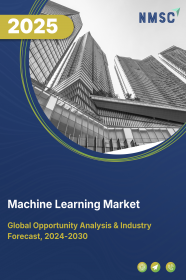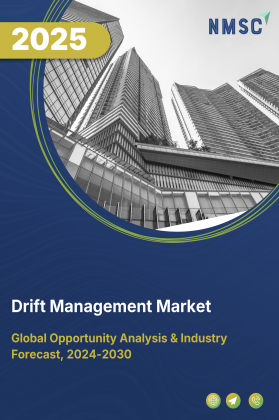
Machine Learning Market by Component (Software, Services, and Machine Learning as a Service (MLaaS)), by Deployment (Cloud and On-premise), by Enterprise Size (Large Enterprises and Small & Medium Enterprises), and by End-User (BFSI, Healthcare & Life Sciences, Retail, Telecommunication, Government & Defense, Education, Media & Entertainment, Manufacturing, Energy & Utilities, Automotive, and Others) – Global Opportunity Analysis and Industry Forecast 2023-2030
Market Definition:
The global Machine Learning Market size was valued at USD 29.84 billion in 2022 and is predicted to reach USD 407.72 billion by 2030 with a CAGR of 45.29% from 2023-2030. Machine learning (ML) is a branch of artificial intelligence (AI) that allows software applications to make predictions with increased accuracy. It relies on various algorithms and techniques developed using various ML programming languages.
Machine learning algorithms use historical data as input to forecast new output values. This process enables systems such as computer vision and natural language processing (NLP) to identify patterns in data, enhance decision-making, and predict future outcomes. The main goal of ML is to facilitate computers to learn autonomously and adapt their actions accordingly, without human intervention or assistance. It also helps to process and analyzes large amounts of data efficiently and accurately.
Market Dynamics and Trends
The machine learning market is driven by the growing adoption of AI-powered machine learning algorithms for automated decision-making in industries such as automotive, electronics, food & beverages, and healthcare. Machine learning algorithms enhance processes, optimize resource allocation, improve product quality, and enable predictive maintenance by analyzing vast amounts of data, identifying patterns, and making informed decisions without human intervention. This leads to increased efficiency, cost savings, and enhanced overall performance for businesses in these industries.
Moreover, the integration of machine learning into the robotics industry along with increasing demand for advanced robotic systems in logistics & warehousing, defence, healthcare and others is further boosting the growth of the machine learning market. For instance, in August 2022, Otis and Cobalt Robotics together developed robots integrated with Dispatch API to ride elevators and provide coverage and security to multiple floors.
In addition, the integration of machine learning in the healthcare industry has led to significant advancements which in turn boosts the growth of the ML market. By analyzing extensive patient data, including medical images and electronic health records, machine learning improves diagnostic accuracy and treatment planning. The healthcare sector's increased investment and adoption of machine learning technologies contribute to the global market's growth.
However, the high cost of machine learning systems along with the lack of skilled and experienced employees to deploy machine learning are the major factors restraining the growth of the machine learning market. On the contrary, the introduction of no-code machine learning & low-code machine learning development are expected to create ample opportunities in the coming years.
No-code platforms offer intuitive drag-and-drop interfaces, enabling users to create ML models without writing complex code. On the other hand, low-code platforms provide a mix of visual development and code customization options. These advancements open up machine learning to a broader audience, accelerating the adoption of AI-driven solutions across various industries and empowering businesses to leverage data-driven insights without the need for extensive programming expertise.
Market Segmentations and Scope of the Study
The machine learning market share is segmented on the basis of component, deployment, enterprise size, end user, and geography. On the basis of components, the market is divided into software, services and machine learning as a service (MLaaS). On the basis of deployment, the market is classified into cloud and on-premise. On the basis of enterprise size, the market is categorized into large enterprises and small & medium enterprises.
On the basis of end-user, the market is bifurcated into BFSI, healthcare & life sciences, retail, telecommunication, government & defense, education, media & entertainment, manufacturing, energy & utilities, automotive, and others. Geographic breakdown and analysis of each of the aforesaid segments include regions comprising North America, Europe, Asia-Pacific, and RoW.
Geographical Analysis
North America holds the dominant share of machine learning market at present and is expected to continue its dominance during the forecast period. This is attributed to factors such as the availability of developed IT infrastructure along with rising investment in cutting-edge technology like artificial intelligence, cloud computing, and others. For instance, in June 2021, Pentagon and the U.S. Department of Defense (DOD) jointly planned to spend USD 874 million on artificial intelligence (AI) and machine learning technologies in 2022.
Also, presence of major key players such as Microsoft Corporation, Facebook Inc., Amazon.com Inc. and IBM Corporation that are launching new products boosts the machine learning industry growth in this region. For instance, in November 2021, Facebook Inc. launched its new machine-learning process called Anticipative Video Transformer (AVT) to predict future actions by using visual interpretation. AVT works as an end-to-end attention-based model for action anticipation in videos. It also analyzes the activity to show results, especially for augmented reality (AR) and the metaverse.
On the other hand, Asia-Pacific is expected to show a steady rise in the machine learning market due to rising digital business and growing awareness of advanced technologies among individuals in this region. For instance, in June 2022, Google announced advanced education on cloud, machine learning and mobile development through Bangkit academy in Indonesia. This academy is designed to produce high-caliber technical talent for Indonesian technology companies and startups.
Moreover, rising research and development activities in machine learning and artificial intelligence (AI) are expected to drive machine learning market growth in this region. For instance, in April 2022, Fujitsu launched a new research center in India with the Indian Institute of Technology Hyderabad and the Indian Institute of Science to accelerate innovation in artificial intelligence (AI) and machine learning technologies. This joint research activity focused on improving the accuracy and resilience of AI and machine learning technology.
Competitive Landscape
The machine learning market trends comprises of various market players such as Google, Microsoft Corporation, Amazon.com Inc., IBM Corporation, Apple Inc., Intel Corporation, Facebook Inc., SAP SE, SAS Institute Inc., and Wipro Limited. These market players are adopting various partnership and acquisition of business across various regions to maintain their dominance in the machine learning industry. For instance, in June 2022, Wipro partnered with Eros Investments to evolve and scale the artificial intelligence (AI) and machine learning (ML) powered content localization solution for global media and entertainment industry. This solution automated the time-consuming manual content localization process of subtitling and dubbing with near human-level accuracy, driving significant cost and time savings.
Moreover, in August 2021, SAP acquired SwoopTalent to boost talent data intelligence enhancing its human experience management capabilities. This acquisition was focused on incorporating the company's data and machine learning intellectual property into their human experience management systems that improves organizational agility and fuel business transformation.
Key Benefits
-
The report provides quantitative analysis and estimations of the machine learning market from 2023 to 2030, which assists in identifying the prevailing market opportunities.
-
The study comprises a deep dive analysis of the machine learning industry including the current and future trends to depict prevalent investment pockets in the market.
-
Information related to key drivers, restraints, and opportunities and their impact on the machine learning market is provided in the report.
-
Competitive analysis of the players, along with their market share is provided in the report.
-
SWOT analysis and Porter's Five Forces model is elaborated on in the study.
-
Value chain analysis in the market study provides a clear picture of roles of stakeholders.
Machine Learning Market Key Segments
By Component
-
Software
-
Services
-
Machine Learning as a Service (MLaaS)
By Deployment
-
Cloud
-
On-premise
By Enterprise Size
-
Large Enterprises
-
Small & Medium Enterprises
By End User
-
BFSI
-
Healthcare & Life Sciences
-
Retail
-
Telecommunication
-
Government & Defense
-
Education
-
Media & Entertainment
-
Manufacturing
-
Energy & Utilities
-
Automotive
-
Others
By Region
-
North America
-
U.S
-
Canada
-
Mexico
-
-
Europe
-
UK
-
Germany
-
France
-
Italy
-
Spain
-
Denmark
-
Netherlands
-
Finland
-
Sweden
-
Norway
-
Russia
-
Rest of Europe
-
-
Asia-Pacific
-
China
-
Japan
-
India
-
South Korea
-
Australia
-
Indonesia
-
Singapore
-
Taiwan
-
Thailand
-
Rest of Asia-Pacific
-
-
RoW
-
Latin America
-
Middle East
-
Africa
-
Key Players
-
Google
-
Microsoft Corporation
-
Amazon.com Inc.
-
IBM Corporation
-
Apple Inc.
-
Intel Corporation
-
Facebook Inc.
-
SAP SE
-
SAS Institute Inc.
-
Wipro Limited
REPORT SCOPE AND SEGMENTATION:
|
Parameters |
Details |
|
Market Size in 2022 |
USD 29.84 Billion |
|
Revenue Forecast in 2030 |
USD 407.72 Billion |
|
Growth Rate |
CAGR of 45.29% from 2023 to 2030 |
|
Analysis Period |
2022–2030 |
|
Base Year Considered |
2022 |
|
Forecast Period |
2023–2030 |
|
Market Size Estimation |
Billion (USD) |
|
Growth Factors |
The machine learning market is driven by the growing adoption of AI-powered machine learning algorithms for automated decision-making in various industries. The integration of machine learning in the healthcare industry has led to significant advancements, driving the market growth. |
|
Countries Covered |
28 |
|
Companies Profiled |
10 |
|
Market Share |
Available for 10 companies |
|
Customization Scope |
Free customization (equivalent up to 80 working hours of analysts) after purchase. Addition or alteration to country, regional, and segment scope. |
|
Pricing and Purchase Options |
Avail customized purchase options to meet your exact research needs. |




















 Speak to Our Analyst
Speak to Our Analyst

























